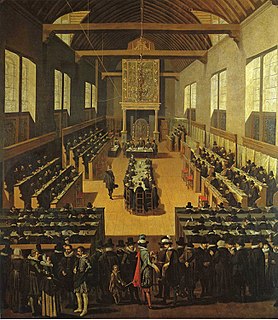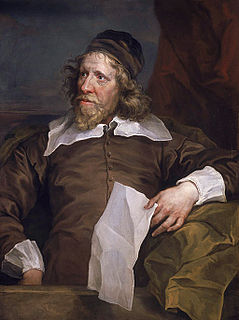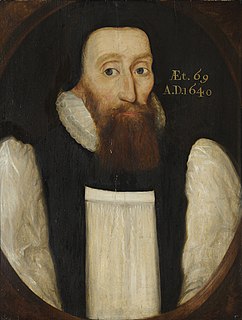
The Synod of Dort was an international Synod held in Dordrecht in 1618–1619, by the Dutch Reformed Church, to settle a divisive controversy caused by the rise of Arminianism. The first meeting was on 13 November 1618 and the final meeting, the 180th, was on 29 May 1619. Voting representatives from eight foreign Reformed churches were also invited. Dort was a contemporary Dutch term for the town of Dordrecht.

Frederick V was the Elector Palatine of the Rhine in the Holy Roman Empire from 1610 to 1623, and reigned as King of Bohemia from 1619 to 1620. He was forced to abdicate both roles, and the brevity of his reign in Bohemia earned him the derisive sobriquet "the Winter King".

Inigo Jones was the first significant architect in England and Wales in the early modern period, and the first to employ Vitruvian rules of proportion and symmetry in his buildings. As the most notable architect in England and Wales, Jones was the first person to introduce the classical architecture of Rome and the Italian Renaissance to Britain. He left his mark on London by his design of single buildings, such as the Queen's House which is the first building in England designed in a pure classical style, and the Banqueting House, Whitehall, as well as the layout for Covent Garden square which became a model for future developments in the West End. He made major contributions to stage design by his work as theatrical designer for several dozen masques, most by royal command and many in collaboration with Ben Jonson.

Philip Massinger was an English dramatist. His finely plotted plays, including A New Way to Pay Old Debts, The City Madam, and The Roman Actor, are noted for their satire and realism, and their political and social themes.

John Marston was an English playwright, poet and satirist during the late Elizabethan and early Jacobean periods. His career as a writer lasted only a decade. His work is remembered for its energetic and often obscure style, its contributions to the development of a distinctively Jacobean style in poetry, and its idiosyncratic vocabulary.
The King's Men is the acting company to which William Shakespeare (1564–1616) belonged for most of his career. Formerly known as the Lord Chamberlain's Men during the reign of Queen Elizabeth I, they became the King's Men in 1603 when King James I ascended the throne and became the company's patron.
Thomas Goffe (1591–1629) was a minor Jacobean dramatist.

Nathan Field was an English dramatist. He was an actor.

John Fletcher (1579–1625) was a Jacobean playwright. Following William Shakespeare as house playwright for the King's Men, he was among the most prolific and influential dramatists of his day; during his lifetime and in the early Restoration, his fame rivalled Shakespeare's. He collaborated on writing plays with Francis Beaumont, and also with Shakespeare on three plays.
In Abrahamic religions, the Messianic Age is the future period of time on Earth in which the messiah will reign and bring universal peace and brotherhood, without any evil. Many believe that there will be such an age; some refer to it as the consummate "kingdom of God" or the "world to come". Jews believe that such a figure is yet to come, while Christians and Muslims believe that this figure will be Jesus.
The Lady Elizabeth's Men, or Princess Elizabeth's Men, was a company of actors in Jacobean London, formed under the patronage of King James I's daughter Princess Elizabeth. From 1618 on, the company was called The Queen of Bohemia's Men, after Elizabeth and her husband the Elector Palatine had their brief and disastrous flirtation with the crown of Bohemia.

George Carleton was an English churchman, Bishop of Llandaff (1618–1619). He was a delegate to the Synod of Dort, in the Netherlands. From 1619 to 1628 he was Bishop of Chichester.

John Davenant was an English academic and bishop of Salisbury from 1621. He also served as one of the English delegates to the Synod of Dort.

The Anglo-Moroccan alliance was established at the end of the 16th century and the early 17th century between the kingdoms of England and Morocco. Commercial agreements had been reached by Queen Elizabeth I of England and the Moroccan Sultan Ahmad al-Mansur on the basis of a common enmity to Philip II of Spain. The arms trade dominated the exchange, and numerous attempts at direct military collaboration were also made.

Mohammed ben Hadou, also Mohammad bin Hadou, Mohammad bin Hadu or Muhammad ben Haddu al'Attar, was a Moroccan ambassador sent to the English court of Charles II by Muley Ismail in 1681-82. According to the contemporary English commentator John Evelyn, he was the son of an English woman.

Morocco–Netherlands relations span a period from the 16th century to the present.

Thomas Pellow, son of Thomas Pellow of Penryn and his wife Elizabeth, was an English author best known for the extensive captivity narrative entitled The History of the Long Captivity and Adventures of Thomas Pellow in South-Barbary. Pellow's book chronicles his many adventures spent during his 23-year-long captivity giving a detailed account of his capture by Barbary pirates, his experiences as a slave under Sultan Moulay Ismail, and his final escape from Morocco back to his Cornish origins.
Elizabeth Howard, courtier to Anne of Denmark.
John Auchmoutie of Scoughall was a Scottish courtier.













